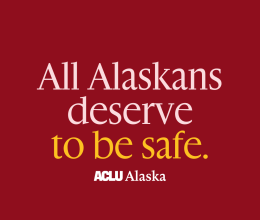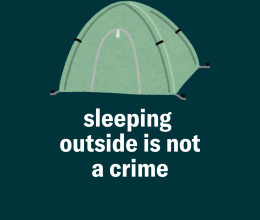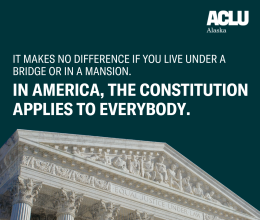
Both tenants and landlords have rights in Alaska that can support stable living and housing situations, and prevent homelessness from occurring. Alaskans with specific questions about their circumstances should consult with an attorney. The Alaska Landlord and Tenant Act does not apply to temporary housing at a shelter or supportive housing program.
Tenant Rights & Responsibilities
Tenants have the right to:
- Be free from discrimination. It is illegal under state law for landlords to refuse to rent to someone because of sex, race, religion, national origin, color, physical or mental disability, marital status, or pregnancy. In Anchorage, it is also illegal to refuse to rent to someone because of age, sexual orientation, gender identity, or familial status.
- Be free from retaliation. A landlord may not retaliate against a tenant for (1) seeking to enforce their rights under the Landlord and Tenant Act, (2) filing a complaint with a government agency, or (3) joining a tenant union. Unlawful retaliation includes turning off services to the unit, raising the rent, and starting or threatening an eviction proceeding.
- Terminate a lease. If the landlord fails to follow the terms of the lease in a way that materially harms the tenant’s health and safety, the tenant has the right to terminate the lease and move out. However, the tenant must first give the landlord notice and an opportunity to fix the issue.
Tenants are responsible for:
- Communication: This includes giving adequate notice before moving out and before taking any enforcement action against the landlord for its failure to meet its responsibilities.
- Respecting the property: This includes (1) keeping the property clean and safe, (2) disposing of all trash and other waste from the unit, (3) not deliberately or negligently destroying anything in the unit or allowing others to do so, and (4) being considerate of other tenants.
- Following the law and the terms of the lease: This includes (1) paying the rent on time and (2) moving out when the rental agreement ends (unless both parties agree to extend the term or to continue the tenancy on a month-to-month basis).
What can a landlord do if the tenant isn’t fulfilling their responsibilities?
If tenants do not meet their responsibilities, the landlord can terminate the rental agreement by written notice and require the tenant to move out. If the tenant doesn’t move out, then the landlord can initiate eviction proceedings.
The amount of notice required will depend on what responsibility the tenant has failed to meet:
- Late rent requires a seven-day notice. If the rent is paid before the seven full days have passed, the tenant may remain.
- Failure to pay utilities requires a five-day notice. If the tenant reinstates service within three days and repays the landlord for any payments made to the utility company, the tenant may remain.
- Illegal activity requires a five-day notice. This provision does not apply to mere possession of illegal drugs or alcohol on the premises.
- Deliberate infliction of substantial damage to the premises (more than $400 damage) requires a minimum of 24 hours and a maximum of five days' notice. Even if the tenant agrees to repair the damage, the landlord can still go through with the eviction.
- Breach of Duties requires a ten-day notice. The landlord can only invoke this if the tenant has breached a material part of the lease or failed to fulfill their responsibilities under the Landlord and Tenant Act so seriously that the health and safety of others are endangered. Minor or inconsequential violations are not grounds for the landlord to terminate the tenancy.
NOTE: Terminating the tenancy does not give the landlord the right to forcibly remove a tenant who has not moved out. This can only be done by the court after the eviction proceedings have been completed.
Landlord Rights & Responsibilities
Landlords have the right to:
-
Make property rules. Landlords can make rules for living at their property; however, they must notify tenants about the rules before they agree to rent the property, and the rules must be reasonable, clearly defined, and apply to all tenants equally. The rules will only be enforced if they have a permissible purpose (e.g., promote the health, safety, and welfare of the tenants).
- Enter the property. A landlord may enter the unit to (1) make necessary or agreed-upon repairs, (2) supply necessary or agreed-upon services, (3) inspect for damages, or (4) show the property to prospective or actual buyers, renters, or contractors. However, the landlord must give the tenant 24 hours notice and say what time they’re coming. The landlord cannot abuse this right or use it to harass tenants.
- Terminate the lease. A landlord has the right to terminate the lease (1) for late rent, (2) for illegal activity, (3) for failure to pay utility bills, (4) for breach of duties, and (4) for deliberate infliction of substantial damage to the property.
Landlords have the responsibility to:
- Communicate. This includes (1) giving the tenant a copy of the written rental agreement, (2) giving the tenant adequate notice of any rent increase (at least 30 days), and (3) giving the tenant the required amount of notice before demanding they move out.
- Maintain a habitable premise. This includes (1) making all necessary repairs, (2) keeping all common areas in a clean and safe condition, (3) maintaining all electrical, plumbing, heating, ventilating, and other utilities in the building, and (4) provide and maintain locks and furnish keys to ensure the safety of the tenant and their property.
- Follow the law and the terms of the lease. This includes (1) making repairs to ensure compliance with local housing codes, (2) returning the tenant’s security deposit when the tenant moves out (or providing itemized list for the amount they kept), and (3) following all other terms specified in the lease.
A lease cannot be used to waive these rights and responsibilities.
Rental agreements cannot require the tenant or the landlord to waive any legal rights under the Landlord and Tenant Act. For example, a rental agreement cannot:
- Limit the liability of landlords or tenants when either has failed to meet their responsibilities
- Make the tenant liable for rent even if the landlord fails to maintain the premises as required by law
- Allow for immediate eviction for nonpayment of rent
- Require the tenant to make all repairs
- Give up the tenant’s right to get their deposit back (e.g., “nonrefundable” pet or security deposits)
- Release the landlord from liability for accidents due to their neglect
To remove illegal wording, draw a line in ink through the provision. Both the landlord and tenant should initial the agreement next to each item that has been removed.
Illegal provisions that are not removed from an agreement are not enforceable, even if both parties sign.
What can a tenant do if the landlord isn’t fulfilling their responsibilities?
A tenant’s options are going to depend on what responsibility their landlord is failing to fulfill:
- If their landlord is failing to provide an essential service (for example, heat, water, sewer, or electricity), the tenant must give their landlord written notice stating the problem and the remedy they plan to take.
- Then, the tenant can do one of three things: they can make the necessary repairs or obtain substitute services, and then deduct the cost from their rent; they can obtain reasonable substitute housing, and then they are excused from paying rent until the problem is resolved; or they can sue the landlord (this is most common when the landlord turned off an essential service to try to force the tenant out of the unit).
- Then, the tenant can do one of three things: they can make the necessary repairs or obtain substitute services, and then deduct the cost from their rent; they can obtain reasonable substitute housing, and then they are excused from paying rent until the problem is resolved; or they can sue the landlord (this is most common when the landlord turned off an essential service to try to force the tenant out of the unit).
-
For any other type of material failure that affects the tenant’s health and safety, the tenant must give their landlord written notice describing the problem and stating that if it is not fixed within ten days, they will move in no less than 20 days. If the problem is not fixed, the tenant may terminate the tenancy and move.
A tenant also may sue in court for money damages and/or a court order requiring the landlord to comply with the rental agreement or the Landlord and Tenant Act (which is known as “injunctive relief”).NOTE:
None of these remedies are available to a tenant if the tenant or their guest caused the problem.
Responding to discrimination
What is illegal discrimination?
In Anchorage, landlords cannot discriminate based on:
- Race
- Sex
- Sexual Orientation*
- Gender Identity*
- Religion
- National Origin
- Marital Status or Change in Marital Status
- Pregnancy
- Age*
- Familial Status*
- Physical or Mental Disability
Traits with an asterix (*) are only prohibited under Anchorage law (as opposed to state-wide).
However, landlords can consider other things, including:
- Eviction history
- Criminal history
What does discrimination look like?
Discrimination can take several forms in the housing context.
These are some indications that a landlord may be engaging in discrimination against potential tenants:
- The apartment the tenant called about is suddenly “already taken” when the landlord sees the tenant
- A unit that the landlord said was rented remains vacant
- The rent or deposit quoted is much higher than that advertised or charged for similar units
- Rules are different for one tenant than for others in the same apartment building
- A real estate broker or agent does not refer a tenant to a rental listing that fits his or her needs
- An advertisement indicates a preference for a certain race, color, religion, sex, age, marital status or national origin
Discrimination can also arise after the lease is signed and the tenant moves in. For example:
- The landlord raises the rent for a tenant who becomes pregnant but not for any other tenants in the building
- The landlord refuses to let the tenant make reasonable modifications to their dwelling, at their expense, that are necessary for them to fully use the housing (e.g., “You may not install grab bars in the bathroom)
What to do if you believe you have witnessed or experienced housing discrimination?
- Write down everything you remember, including the names and contact information of all parties involved, the date that the relevant event(s) occurred, and a description of the event(s) themselves.
- Get contact information for any witnesses or other people who can attest to what happened.
- Take photographs or screenshots of any communications between the parties or other relevant messages. (For example, if the housing discrimination was an apartment advertisement that said “No one below the age of 25 need apply<‘ be sure to take of a photo of that advertisement).
- Once you have all of this information, you can file a written complaint with the entities on the prior slide.
- Do not submit the original versions of any relevant documents (e.g., lease agreements). Only submit copies.
- Be sure to keep a copy for yourself of any reports you submit.
Remember: There is a limited time to bring a complaint about alleged discrimination. Complaints to the Anchorage Equal Rights Commission must be filed within 180 days. Complaints to the Alaska Human Rights Commission must be filed within 300 days.
Who can you report discrimination to?
The following entities are groups which you can report discrimination:
- Alaska State Commission for Human Rights. The state agency that enforces the Alaska Human Rights Law, which prohibits housing discrimination state-wide.
- Anchorage Equal Rights Commission. The municipal agency that enforces Anchorage’s anti-discrimination laws, including with respect to housing.
- Alaska Legal Services Corporation. A non-profit that provides free legal assistance on civil matters to low-income Alaskans (must be below 125% of the federal poverty guidelines).
- Disability Law Center. A non-profit that provides legal advocacy to people with disabilities across Alaska.
- ACLU of Alaska. A non-profit that defends the civil rights and liberties of all Alaskans through litigation, advocacy, and community engagement.

